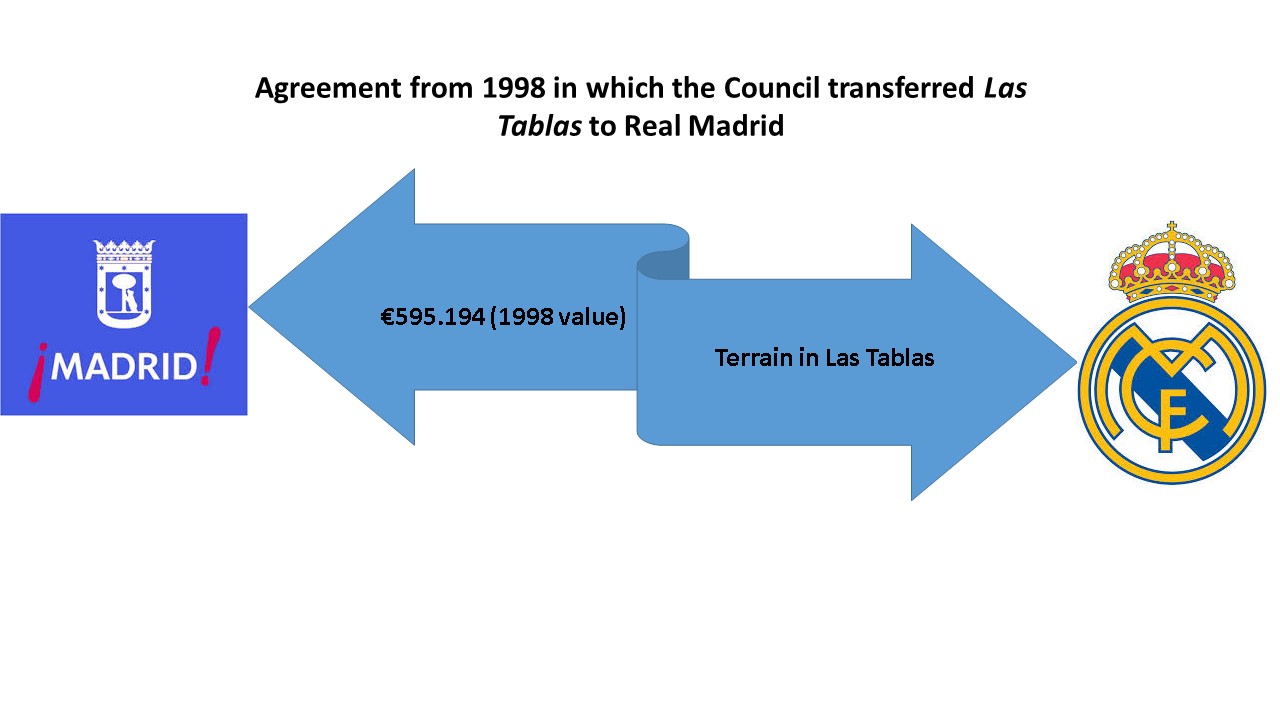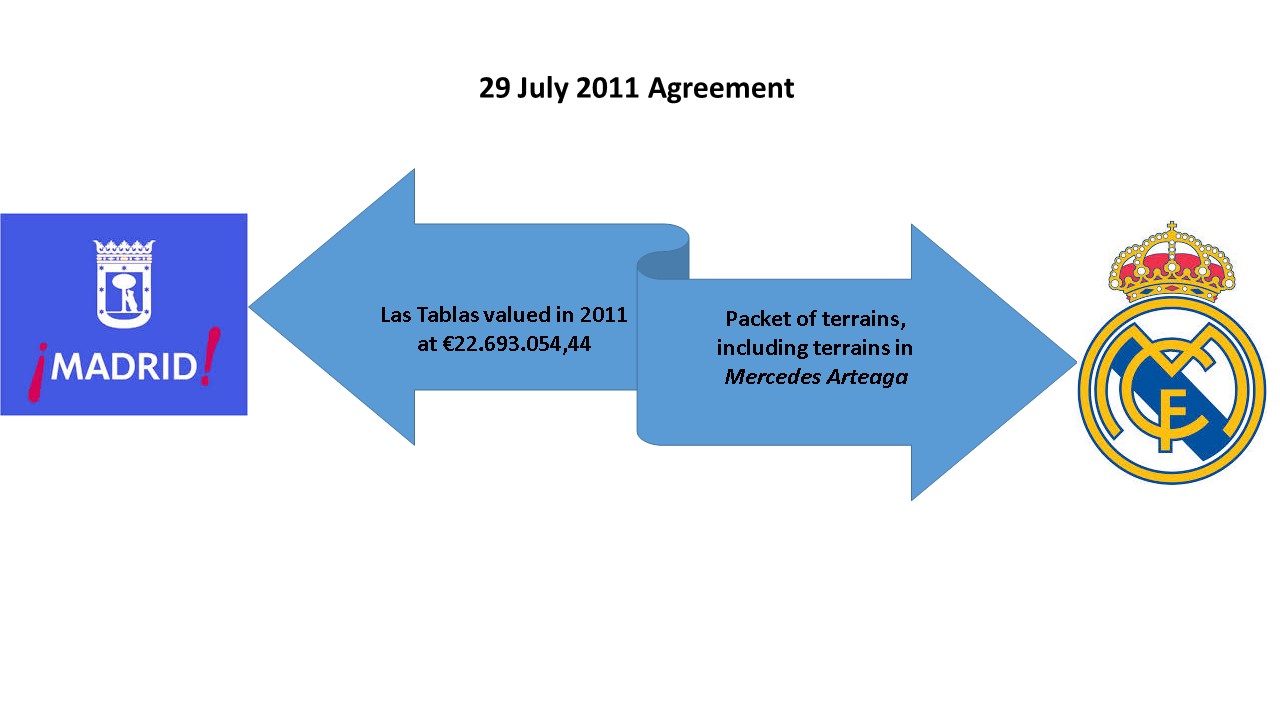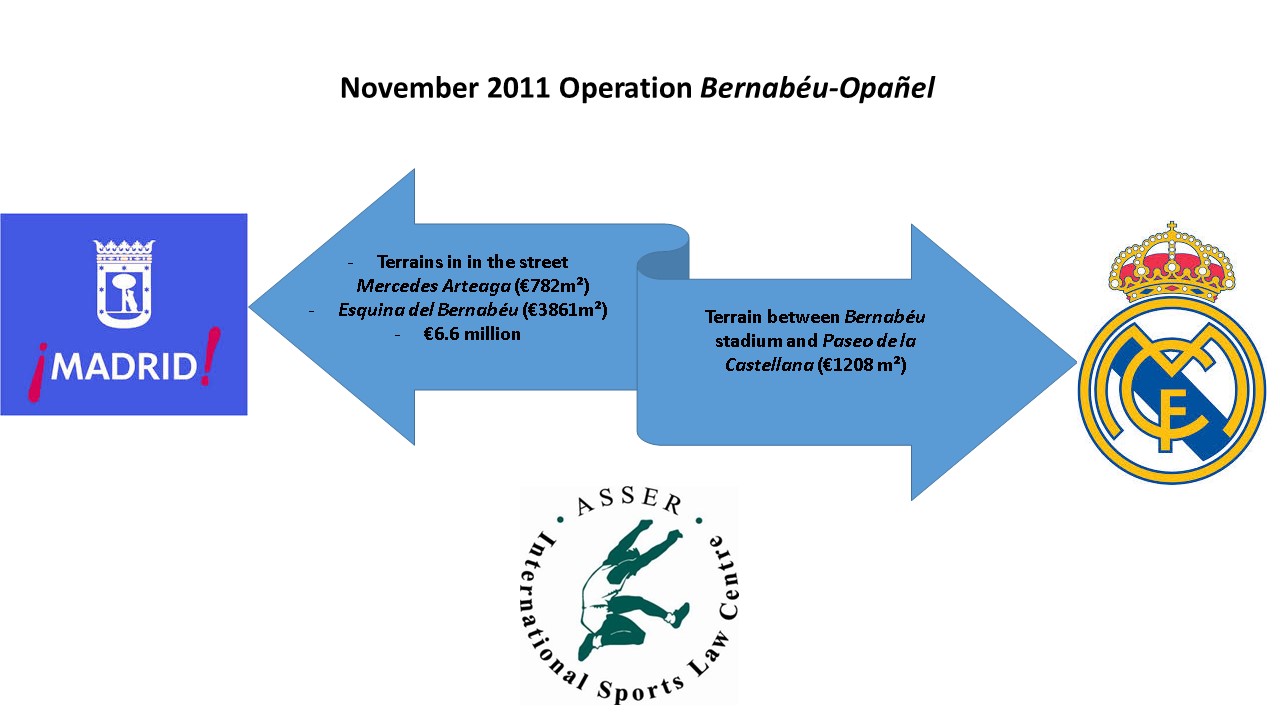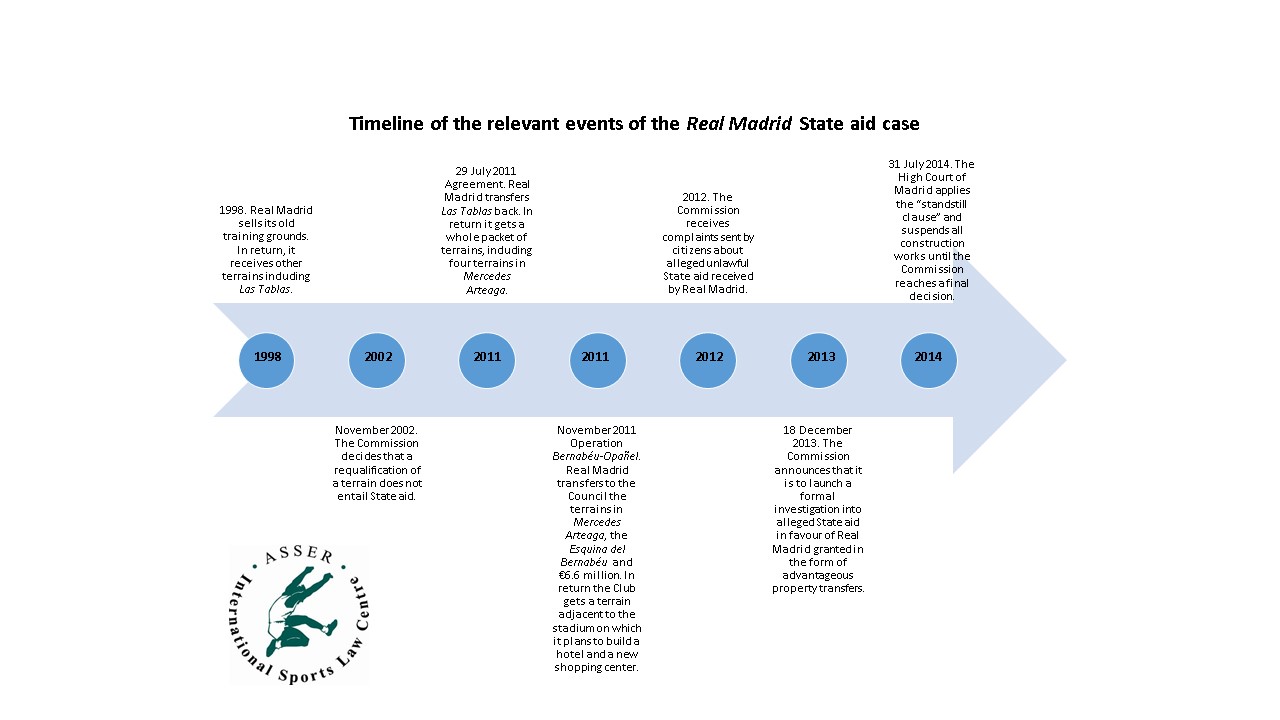This is the
first part of a blog series involving the Real
Madrid State aid case.
Apart from being
favoured by many of
Spain’s most important politicians, there have always been suspicions
surrounding the world’s richest football club regarding possible financial aid by the Madrid City Council. Indeed, in
the late 90’s a terrain qualification change by the Madrid City Council proved to
be tremendously favourable to the king’s club. The change allowed Real Madrid
to sell its old training grounds for a huge sum. Though the exact price for the
grounds remains unknown, Real Madrid was suddenly capable of buying players
like Figo and Zidane for record fees. However, the European Commission, even
though agreeing that an advantage was conferred to the club, simply stated that the new
qualification of the terrain in question does not appear to involve any
transfer of resources by the State and could therefore not be regarded as State
aid within the meaning of article 107 TFEU.
Agreements
between the club and the Council have been a regularity for the last 25
years. A more recent example concerns an
agreement signed on 29 July 2011 (Convenio29-07-2011.pdf (8MB).
The agreement regularizes two earlier agreements between the Council and Real
Madrid dating from 1991 and 1998 respectively. The commitments deriving from
those earlier agreements were not followed by the relevant parties and
therefore had to give way to a new agreement. A closer look at the 29 July 2011
Agreement exposes a bizarre chain of events. It turned out that in 1998 Real
Madrid transmitted an undivided half of their old training grounds to the
municipality. Apart from a large sum of money, the club was to receive a number
of terrains spread out over the municipality, including a terrain located in
the area called Las Tablas valued at
€595.194 in 1998. However, due to its qualification for sporting usage, the
Council concluded in 2011 that the parcel could not be transferred to the club
due to the fact that Madrid’s urbanity laws only permit a transfer of urban or
urbanizable terrains. For that reason, the Council agreed to compensate the
football club not for the original value of €595.194 but for a staggering €22.693.054,44! Real Madrid was not compensated in the form
of a sum, but rather it was presented with a packet of terrains including four
terrains of a total area of 12.435 m/2 in the street Mercedes Arteaga in the Carabanchel district of Madrid.
The year 2011 also saw a second agreement between the Council of Madrid
and the football club, this time concerning construction works on the Real
Madrid stadium Santiago Bernabéu.
This agreement, dating from November 2011, is known as operation Bernabeú-Opañel and includes the following plans. The Council is to transfer to the club a terrain constituting a 12.250
m/2 buildable surface which borders the west-side of the Bernabéu stadium. This acquirement permits Real Madrid to cover the
stadium with a roof, to build a shopping centre and a hotel on the façade
situated on the Paseo de la Castellana
(one of Madrid’s most important streets). In return, the club firstly agreed to
transfer to the Council the shopping centre Esquina
del Bernabéu, which is situated at the South-East-side of the stadium with
a buildable surface of 6.858 m/2. The Council would then demolish the shopping
centre and convert it into a public park. Secondly, the club is to transfer
back to the Council part of the four terrains located in the street Mercedes Arteaga that it received as
part of the 29 July 2011 Agreement. In
addition to the transfers of the old shopping centre and the terrains located
in the street Mercedes Arteaga, Real
Madrid is also to pay €6.6 million to the Council. The Council, however,
encountered an obstacle in its own urban laws. The Plan General de Ordenación Urbana de Madrid de 1997 (PGOU) did not
permit private parties, like Real Madrid, to construct on public terrains owned
by the Council. Therefore, on 16 November 2012, the Government of the
autonomous region of Madrid announced that the PGOU is to be modified ad hoc for the
operation Bernabeú-Opañel.
By means of the operation Bernabeú-Opañel,
Real Madrid expressed that it hopes to “convert the Club in a sporting institution of reference
in the world. The aim is for the stadium to have a maximum level of comfort and
services superior to the most modern and advanced sporting stadiums in the
world” (PropuestaRealMadrid.pdf (914.2KB)). According to the Council, the operation will not only improve sporting
and leisure facilities in the city, it will also create up to 9.546 m/2 of
“green zones”. Moreover, the investment for the construction works will be
borne only by Real Madrid and it is expected that the construction works will
give employment to more than 2 000 people and the exploitation to 600 people.


 In 2012, the ecological movement Ecologistas
en Acción found several legal irregularities with regard to the 29 July Agreement operation
Bernabeú-Opañel and (unsurprisingly)
concluded that the agreements appeared to be very beneficial for Real Madrid. It
therefore started legal proceedings in front of the Spanish administrative
Court claiming that the ad hoc modification of the PGOU was illegal. It would later on launch on appeal in front of the Tribunal Superior de Justicia de Madrid, or Madrid High Court (TSJM-Order-31-07-2014.pdf (112.3KB)). Simultaneously, it informed the European Commission of potential
unlawful State aid granted by the Council of Madrid to Real Madrid. To Spain’s outrage, on 18 December 2013, the Commission declared
that it had enough reasons to believe that the incriminated transactions might
involve State aid and launched a formal investigation in accordance with Article 108(2) TFEU. Concretely,
the Commission expressed the following concerns:
In 2012, the ecological movement Ecologistas
en Acción found several legal irregularities with regard to the 29 July Agreement operation
Bernabeú-Opañel and (unsurprisingly)
concluded that the agreements appeared to be very beneficial for Real Madrid. It
therefore started legal proceedings in front of the Spanish administrative
Court claiming that the ad hoc modification of the PGOU was illegal. It would later on launch on appeal in front of the Tribunal Superior de Justicia de Madrid, or Madrid High Court (TSJM-Order-31-07-2014.pdf (112.3KB)). Simultaneously, it informed the European Commission of potential
unlawful State aid granted by the Council of Madrid to Real Madrid. To Spain’s outrage, on 18 December 2013, the Commission declared
that it had enough reasons to believe that the incriminated transactions might
involve State aid and launched a formal investigation in accordance with Article 108(2) TFEU. Concretely,
the Commission expressed the following concerns:
1) The Commission doubts whether it
was impossible for the Council of Madrid to transfer the Las Tablas property to Real Madrid;
2) The Commission doubts that a
market value of the Las Tablas plot
of land has been sought;
3) The Commission doubts the market
conformity of the value of the properties which were transferred to Real Madrid
by the 2011 Agreement and at the occasion of the subsequent further exchange of
land around the Bernabéu Stadium, and;
4) The Commission doubts that there
is an objective of common interest, which could justify selective support to a
very strong actor in a highly competitive economic sector.
The Commission’s doubts seem, in light of the
facts at hand, reasonable. To decide whether or not the land transactions qualifies
as unlawful State aid, however, the four cumulative criteria of Article 107(1)
TFEU need to be fulfilled. (1) The aid must confer an economic advantage on Real
Madrid; (2) it must be granted by a Member State or through State resources;
(3) the advantage must be selective and distorts or threatens to distort competition;
and (4) it must affect trade between Member States.
Advantage to Real
Madrid over its competitors
As the Commission pointed out in paragraph 21 of its notice initiating
the infringement procedure against Spain, “Real Madrid appears to enjoy an
economic advantage from the fact that a plot of land, which at the time of its
acquisition was valued at €595,194, appears 13 years later, in an operation to
offset mutual debts, with a value of more than €22 million”. Furthermore, there
are also doubts regarding the market conformity of the lands transferred in the
operation Bernabéu-Opañel. In
situations where the public authorities wish to sell public property to private
investors, it should make sure that the revenue obtained from the sale is
comparable to market level. This criterion is also known as the “market economy
vendor principle”. In accordance with the Land sale Communication, should the public
authorities wish to avoid any advantage to the recipient over its competitors
during a land sale transaction, it should apply one of the two following
procedures: (1) an unconditional bidding procedure or (2) a procedure where the
land is valued by one or more independent asset valuers prior to the sale
negotiations. The Court of Justice has ruled that other methods may also
achieve the same result, but in order to comply with EU State aid rules, the
national provisions establishing rules for calculating the market value of land
must in all cases lead to a price as close as possible to the market value.[2] Special obligations for
the buyer, such as urban planning requirements, do play a role when determining
whether or not the land was sold at market value. Furthermore, land transfer deals,
which often consist of more than just one land transaction, have to be
scrutinized in their entirety.[3]
Therefore, to determine whether an advantage was conferred to Real Madrid, both
agreements between the club and the Council have to be take into account with a
special focus on the valuation methods used.
In 1998, the valuation for the terrain in Las Tablas (€595,194) was done by the administration of Madrid, on
the basis of legislation which offers a technique to determine the value of
urban real property. The calculated value for the same terrain in Las Tablas in 2011 amounted to €22.693.054,44. According to a valuation report released by the
Municipal Valuation Department, the
value was calculated in accordance the same application rules. Yet it has to be
borne in mind that the Municipal Valuation Department forms part of the Área de Gobierno de Urbanismo y Vivienda del
Ayuntamiento de Madrid. Not only is the Área
de Gobierno de Urbanismo y Vivienda the main public authority regarding
urban planning in Madrid, it is together with Real Madrid the main party in the
2011 Agreement itself.
Real Madrid was not compensated in the form of a payment, but rather it
was presented with another packet of terrains valued at €19,972,348.96. In the
valuation report released by the Municipal Valuation Department, a list is included with average terrain
values per district calculated by the independent appraiser Tasamadrid. In continuation, the
Municipal Valuation Department applied a formula based on its own legislation
to determine the final value of the terrains. This packet of terrains included
land in the street Mercedes Arteaga,
valued at €4,360,862 which were transferred back to the municipality in the
operation Bernabéu-Opañel.
The operation Bernabéu-Opañel
also included the club transferring the old shopping centre Esquina del Bernabéu and added a payment
of €6,6 million. A second valuation report indicates that the value of the Esquina del Bernabéu is €3,861 per
square meters passed on the average values of terrains found in adjacent
streets. Furthermore, the Council “requalified” the terrain between the Bernabéu stadium and the street Paseo de la Castellana by ad hoc
modifying the local urban laws (PGOU) before transferring it to Real Madrid. The
value of this terrain is also calculated in the second report and ads up to
€1,208 per square meter. Even though two of the terrains in question can be
found in the same area, the value per square meter of the Esquina Bernabéu is much higher (€3,861) as compared to the value
of the land between the Bernabéu stadium
and the street Paseo de la Castellana
(€1,208). True, the terrain with the Esquina
del Bernabéu has already been built on, thereby increasing the value, but
one should keep in mind that the operation Bernabéu-Opañel
consists of demolishing the Esquina del
Bernabéu and turning it into a green zone. On the other, the other terrain
will be used for the construction of a hotel and a new shopping centre.
Secondly, a quick glance at other real estate transfers in the same area of
Madrid shows that the value of the terrains is in fact much higher. In 2012,
the Picasso tower was purchased by a private firm for €400 million, or €5000
m/2. Today, the building Torre Titania
can be bought for €11,000 m/2 and the building Castellana 200 is for sale for €150
million.
With all the above in mind, one could legitimately get the feeling that
the actual aim of the Agreement of 29 July 2011 was to pave the way for the
operation “Bernabéu-Opañel”, as some media suggested. Unlike in the Konsum Nord case, where the General Court held that the presence of
a link between different transactions could mean that the measure in question does
not constitute State aid, the link between the agreements in the Real Madrid
case only increases suspicions regarding unlawful State aid. Furthermore, the
Council of Madrid has also been inconstant regarding its valuation methods. The
value of the terrain in Las Tablas
was calculated without an independent appraiser and the value of the Esquina del Bernabéu was calculated using
the average value of terrains found in adjacent streets. In short, there are
good reasons to believe that the transactions were made in order to provide a
financial advantage to Real Madrid.
The remaining three criteria of Article 107(1) TFEU and possible
justifications will be discussed in an upcoming blog post.

[1] Notes are omitted. A comprehensive article can be accessed at Oskar van Maren, "The Real Madrid case: A State aid case (un)like any other?".
[2] Case C-239/09 Seydaland
Vereinigte Agrarbetriebe [2010] ECR I-13083, §33-35
[3] Case T-244/08 Konsum Nord ekonomisk förening v Commission [2011] ECR II-0000, §58